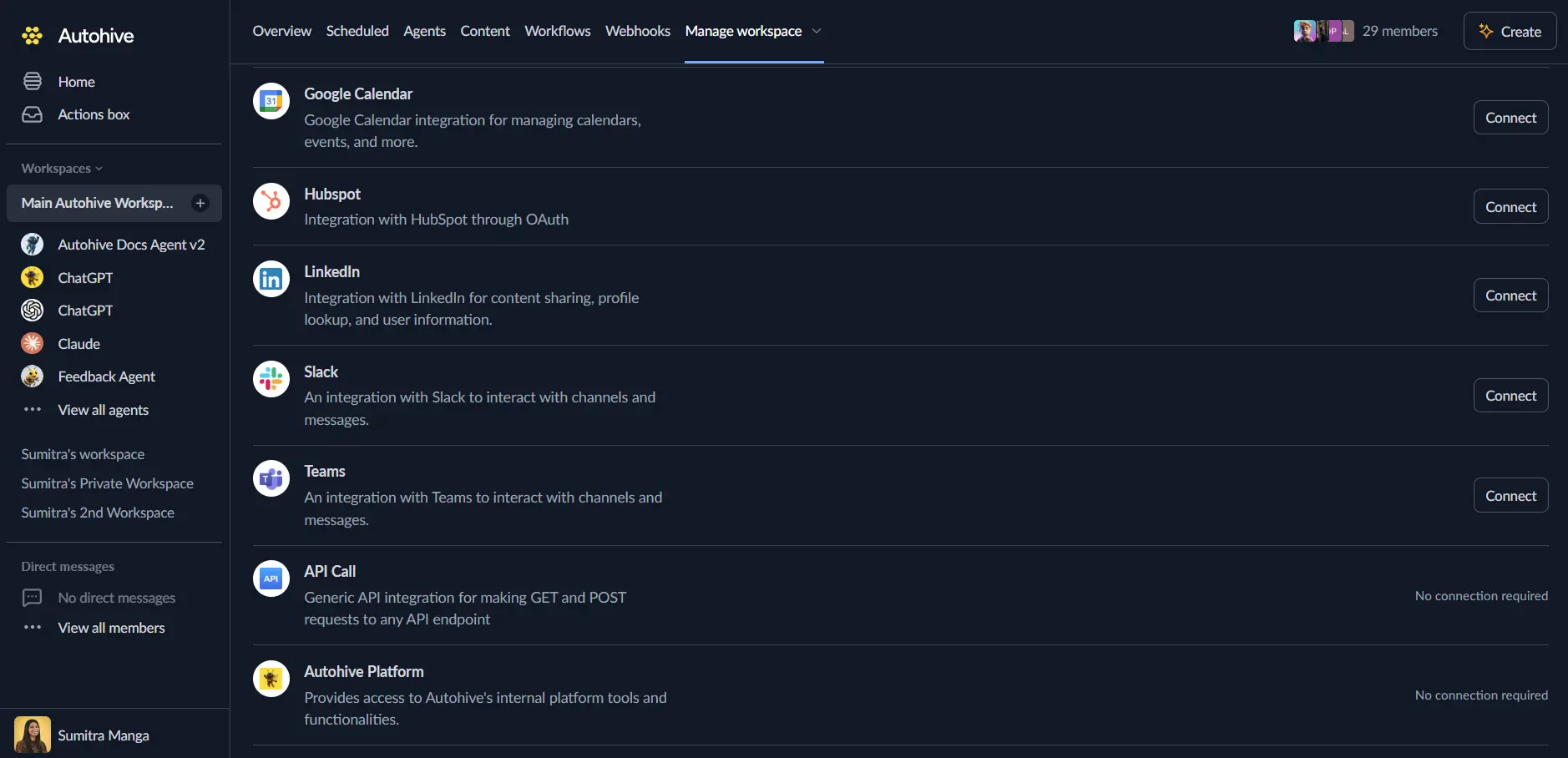Google Calendar
The Autohive Google Calendar integration connects your Google Calendar with Autohive’s automation platform, enabling:
- Event management - Create, read, update, and delete calendar events with full details and metadata
- Calendar access - List and manage multiple Google calendars including personal and shared calendars
- Scheduling automation - Automate meeting creation, event updates, and calendar synchronization
- Attendee management - Handle meeting invitations, attendee lists, and RSVP tracking
- Time-based workflows - Create events based on triggers, deadlines, and scheduled activities
- Multi-calendar support - Work with both personal and shared Google Calendar accounts
- Event filtering - Search and filter events by date ranges, calendars, and criteria
Install the integration
Log in to Autohive and navigate to Your user profile > Connections or Your workspace -> Manage workspace
Locate the Google Calendar Integration card and click Connect

Select your Google account and click Choose Account
Review and approve permissions. Autohive requests access to:
Ensure you approve the permissions required in order for the integration to function as expected.
Confirm installation - you’ll be redirected to Autohive with “Connected” status displayed
Use the integration
You can now use the integration with your agents, workflows and scheduled tasks!
- Follow our Create your first agent guide on how to create an agent.
- In the ‘Agent settings’, scroll down to the ‘Add capabilities’ section and turn on the Google Calendar capability. You can choose what individual Google Calendar capabilities to turn on and off.
- Once the settings have been selected, begin prompting the agent of the workflow you’d like to achieve with Autohive and Google Calendar!
Available capabilities
Calendar Management
- List Calendars: Retrieve all accessible Google calendars with details, permissions, and metadata
- Calendar Discovery: Find and access both personal and shared calendars across your account
- Multi-Calendar Operations: Work with different calendar types including work, personal, and team calendars
Event Operations
- Create Event: Schedule new events with comprehensive details including times, locations, and attendees
- Get Event: Retrieve detailed information about specific events including all metadata
- Update Event: Modify existing events while preserving unchanged properties and relationships
- Delete Event: Remove events from calendars when needed for workflow automation
- List Events: Browse events with filtering by calendar, date range, and custom criteria
Event Types and Features
- Timed Events: Create events with specific start and end times in any timezone
- All-Day Events: Schedule all-day events for holidays, deadlines, and milestone tracking
- Recurring Events: Handle repeating events and series with complex recurrence patterns
- Event Locations: Set and manage event locations with address and venue information
Attendee Management
- Attendee Invitations: Add and remove attendees from calendar events automatically
- RSVP Tracking: Monitor attendee responses and meeting confirmations
- Meeting Coordination: Automate meeting setup and attendee communication
- Multi-Attendee Events: Handle large meetings and team events efficiently
Advanced Scheduling
- Date Range Filtering: Find events within specific time periods for planning and analysis
- Pagination Support: Handle large event lists efficiently with token-based pagination
- Timezone Management: Work with events across different timezones accurately
- Custom Event Properties: Set event descriptions, visibility, and custom metadata
Key features
Comprehensive Event Data
- Access complete event information including creation and modification timestamps
- Handle event metadata like descriptions, locations, and custom properties
- Support for event attachments and additional resources
- Maintain event relationships and calendar associations
Flexible Time Management
- Support for both timed events and all-day events
- Accurate timezone handling for global calendar coordination
- Date and time parsing with RFC3339 format support
- Flexible date range queries for event discovery
Integration Automation
- Event-driven workflows triggered by calendar changes
- Automated event creation based on external triggers
- Scheduled event management and updates
- Cross-platform calendar synchronization
Google Calendar API Compliance
- Full compatibility with Google Calendar’s official API
- Respect rate limits and usage quotas
- Secure OAuth 2.0 authentication
- Support for Google Workspace and personal accounts
Common use cases
Business Automation
- Schedule meetings automatically based on project milestones
- Create recurring team meetings and status check-ins
- Coordinate event scheduling across multiple teams
- Automate calendar invitations and attendee management
Project Management
- Create project deadline events automatically
- Schedule milestone review meetings
- Coordinate project timelines with calendar events
- Track project phases with calendar milestones
Personal Productivity
- Automate personal task scheduling and reminders
- Create events from email content or task management systems
- Schedule recurring personal activities and habits
- Coordinate personal and work calendar events
Team Coordination
- Schedule team meetings based on availability
- Create shared calendar events for team activities
- Automate meeting room booking and resource scheduling
- Coordinate cross-team collaboration and meetings
Event creation examples
Simple Meeting
Create a basic team meeting with time, location, and attendees automatically scheduled based on workflow triggers.
All-Day Event
Schedule project deadlines, holidays, and milestone events that span entire days without specific times.
Recurring Events
Set up weekly team stand-ups, monthly reviews, and quarterly planning sessions with automated recurrence.
Multi-Attendee Coordination
Handle large meetings with automatic attendee invitation and RSVP tracking across departments.
Disconnect the integration
Important: Disconnecting stops data synchronization but preserves existing data in both systems.
- Navigate to Your user profile -> Connections or Your workspace -> Manage workspace
- Find the Google Calendar Integration
- Click Disconnect and confirm
Data Impact: Existing data remains unchanged in both systems, but sync stops and Autohive loses Google Calendar API access.
Uninstall the app
From Google: Go to your Google Account settings > Security > Third-party apps with account access > Find Autohive and revoke access